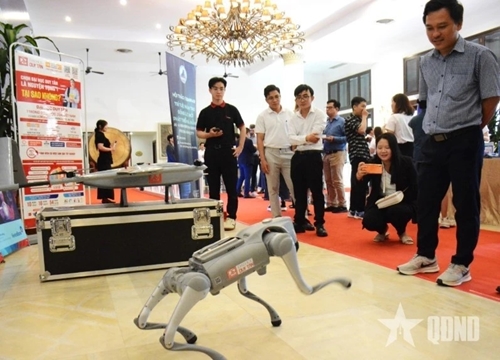According to experts, to achieve this vision, the city must implement a comprehensive set of both short-term and long-term solutions.
Inherent potential, advantages
The Fourth Industrial Revolution is reshaping the global socio-economic landscape. AI, in particular, is emerging as a critical foundation for digital transformation, innovation, and enhanced competitiveness at both national and local levels. As an inevitable trend, AI offers cities like Da Nang new opportunities to optimize governance, stimulate economic growth, and improve quality of life.
    |
 |
|
Delegates experience artificial intelligence products displayed at a workshop themed "Artificial Intelligence - New driving force for Da Nang's development." (Photo: qdnd.vn) |
According to Le Son Phong, Deputy Director of the Da Nang Department of Science and Technology, the city’s AI development strategy is built on 25 years of experience in software development and digital transformation, with the advantage of a skilled workforce. AI is being integrated not only within the tech sector but across various aspects of daily life to accelerate economic restructuring and the application of high technology.
Da Nang’s approach was developed upon the three pillars of human resources, infrastructure, and policy. Policy and infrastructure development are guided by close collaboration with universities and businesses. Following the National Assembly’s Resolution No.136/2024/QH15, which introduces special mechanisms for Da Nang’s urban governance, the municipal People’s Council has issued policies to implement the resolution. Currently, 30% of the AI workforce in Da Nang Software Park No. 2 are top-tier experts, demonstrating the city’s growing capacity in semiconductors and AI.
Dr Le Quang Dam, General Director of Marvell Technology Vietnam, explained that Marvell’s decision to open a Da Nang office in May 2024 and its recognition as a strategic partner in AI and semiconductors were driven by the city’s strong potential. Government support, infrastructure readiness, and a young, increasingly skilled workforce have made Da Nang a prime candidate to lead in these fields.
Anthony Tuan Phan, Founder and CEO of AIAIVN, noted that the city offers advanced data centers, a functioning smart city governance model, and an open, enabling environment, which are favorable conditions for AI growth.
Assoc. Prof., Dr. Huynh Cong Phap, Rector of the Vietnam-Korea University of Information and Communication Technology (University of Da Nang), highlighted the growing focus on semiconductor education. Three universities have begun offering training, with 250 seats available for incoming students. His university has enrolled 60 students in its first intake for semiconductor design engineering, with targets to train 600–1,000 engineers by 2028. Da Nang is also developing generous support policies for semiconductor and AI professionals, including attractive salaries, living allowances, and housing subsidies.
Coordinated solutions needed
At a recent seminar hosted by the Da Nang People's Committee, experts proposed several strategic measures. Vu Anh Tu, Chief Technology Officer of FPT Group, stressed the importance of attracting high-quality talent, international tech companies, and investment in research and data centers. To support this, Da Nang must develop modern working environments and social infrastructure to retain professionals.
Dr. Christopher Cuong Nguyen, Founder and Chairman of Aitomatic Inc., identified five key priorities for Da Nang and Vietnam, namely establishing an innovation center, creating a capital market for tech enterprises, developing a tech ecosystem, launching a venture capital fund, and scaling up education and recruitment of high-quality tech talent. He also suggested building an R&D center specializing in AI research and development to attract global companies.
AI expert Albert Antoine highlighted the importance of a clear and flexible strategy, along with dedicated funding for AI development, based on Singapore's experience. He noted that Singapore's success is attributed to strategic investments in infrastructure, transparent governance, and a policy environment that fosters innovation. Antoine urged Da Nang to develop a comprehensive AI strategy that aligns with economic goals and aims to improve the quality of life. He also recommended strengthening partnerships between government, universities, and businesses, as well as creating strong incentives to attract technology investments.
The development of AI is a long-term journey that requires strategic vision, global partnerships, and consistent policy support, as well as the steadfast companionship and spirit of innovation of the young business community.
Permanent Vice Chairman of the Da Nang People’s Committee, Ho Ky Minh, stated that the city is actively pursuing digital transformation and the integration of AI in various sectors, including healthcare, education, tourism, logistics, public services, and smart urban governance. Additionally, the city has been preparing land, infrastructure, and talent while refining policies to attract both domestic and international investments.
He affirmed the city’s commitment to supporting all organizations, businesses, and researchers in developing a comprehensive and sustainable AI ecosystem.
Source: VNA